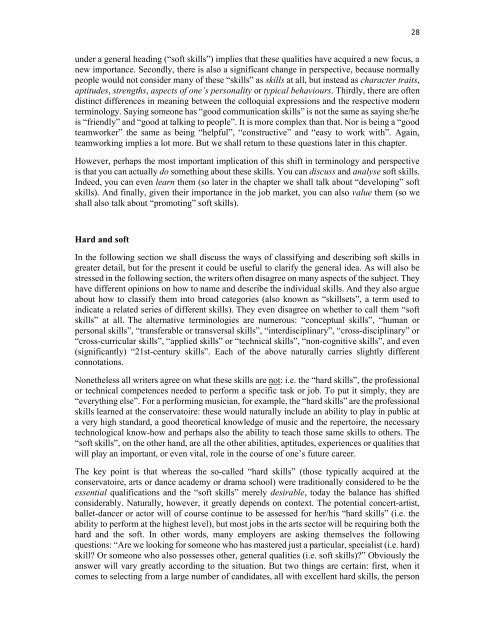and Music
Omega-Book
Omega-Book
You also want an ePaper? Increase the reach of your titles
YUMPU automatically turns print PDFs into web optimized ePapers that Google loves.
28<br />
under a general heading (“soft skills”) implies that these qualities have acquired a new focus, a<br />
new importance. Secondly, there is also a significant change in perspective, because normally<br />
people would not consider many of these “skills” as skills at all, but instead as character traits,<br />
aptitudes, strengths, aspects of one’s personality or typical behaviours. Thirdly, there are often<br />
distinct differences in meaning between the colloquial expressions <strong>and</strong> the respective modern<br />
terminology. Saying someone has “good communication skills” is not the same as saying she/he<br />
is “friendly” <strong>and</strong> “good at talking to people”. It is more complex than that. Nor is being a “good<br />
teamworker” the same as being “helpful”, “constructive” <strong>and</strong> “easy to work with”. Again,<br />
teamworking implies a lot more. But we shall return to these questions later in this chapter.<br />
However, perhaps the most important implication of this shift in terminology <strong>and</strong> perspective<br />
is that you can actually do something about these skills. You can discuss <strong>and</strong> analyse soft skills.<br />
Indeed, you can even learn them (so later in the chapter we shall talk about “developing” soft<br />
skills). And finally, given their importance in the job market, you can also value them (so we<br />
shall also talk about “promoting” soft skills).<br />
Hard <strong>and</strong> soft<br />
In the following section we shall discuss the ways of classifying <strong>and</strong> describing soft skills in<br />
greater detail, but for the present it could be useful to clarify the general idea. As will also be<br />
stressed in the following section, the writers often disagree on many aspects of the subject. They<br />
have different opinions on how to name <strong>and</strong> describe the individual skills. And they also argue<br />
about how to classify them into broad categories (also known as “skillsets”, a term used to<br />
indicate a related series of different skills). They even disagree on whether to call them “soft<br />
skills” at all. The alternative terminologies are numerous: “conceptual skills”, “human or<br />
personal skills”, “transferable or transversal skills”, “interdisciplinary”, “cross-disciplinary” or<br />
“cross-curricular skills”, “applied skills” or “technical skills”, “non-cognitive skills”, <strong>and</strong> even<br />
(significantly) “21st-century skills”. Each of the above naturally carries slightly different<br />
connotations.<br />
Nonetheless all writers agree on what these skills are not: i.e. the “hard skills”, the professional<br />
or technical competences needed to perform a specific task or job. To put it simply, they are<br />
“everything else”. For a performing musician, for example, the “hard skills” are the professional<br />
skills learned at the conservatoire: these would naturally include an ability to play in public at<br />
a very high st<strong>and</strong>ard, a good theoretical knowledge of music <strong>and</strong> the repertoire, the necessary<br />
technological know-how <strong>and</strong> perhaps also the ability to teach those same skills to others. The<br />
“soft skills”, on the other h<strong>and</strong>, are all the other abilities, aptitudes, experiences or qualities that<br />
will play an important, or even vital, role in the course of one’s future career.<br />
The key point is that whereas the so-called “hard skills” (those typically acquired at the<br />
conservatoire, arts or dance academy or drama school) were traditionally considered to be the<br />
essential qualifications <strong>and</strong> the “soft skills” merely desirable, today the balance has shifted<br />
considerably. Naturally, however, it greatly depends on context. The potential concert-artist,<br />
ballet-dancer or actor will of course continue to be assessed for her/his “hard skills” (i.e. the<br />
ability to perform at the highest level), but most jobs in the arts sector will be requiring both the<br />
hard <strong>and</strong> the soft. In other words, many employers are asking themselves the following<br />
questions: “Are we looking for someone who has mastered just a particular, specialist (i.e. hard)<br />
skill? Or someone who also possesses other, general qualities (i.e. soft skills)?” Obviously the<br />
answer will vary greatly according to the situation. But two things are certain: first, when it<br />
comes to selecting from a large number of c<strong>and</strong>idates, all with excellent hard skills, the person


